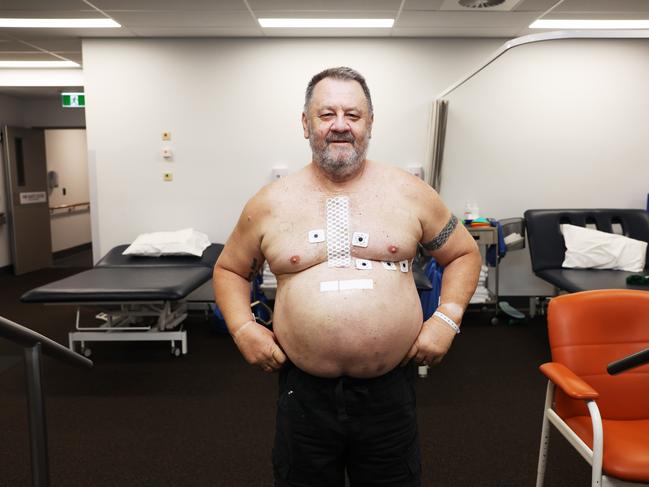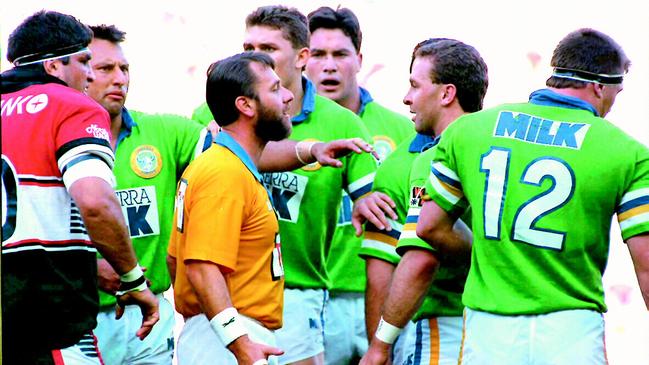Former first grade referee Greg McCallum reveals pain behind shock triple heart bypass
Former first grade grand final referee Greg McCallum opens up to DEAN RITCHIE about his heart anguish revealing the day the engine that kept him alive was stopped.

NRL
Don't miss out on the headlines from NRL. Followed categories will be added to My News.
While in a Sydney hospital preparing for a triple heart bypass, a nurse approached former first grade grand final referee Greg McCallum and declared: “I’m the one who will be holding your heart during surgery.”
“It was frightening,” McCallum said.
McCallum, 67, feared dying from the complex operation after complaining of heart pain when completing menial tasks like taking out the garbage bin.
With surgery now a success, doctors hope the improved arteries secured to McCallum’s heart will give him a 20-year life extension.
McCallum underwent the bypass on December 4 at the Sydney Adventist Hospital, Wahroonga, where he remains in rehab until an expected release on Monday.
He controlled 240 first grade games, five State of Origin matches, 13 Tests and five World Cup games between 1983 and 1994 while also refereeing 16 finals games including grand finals in 1992, 1993 and 1994.
While terrified pre-surgery, McCallum emerged to cheekily retort: “It shows referees do have a heart.”
Asked whether he feared dying, McCallum: “Yes, absolutely. I was almost in shock and your mind goes to all different places. It’s the fact that you just don’t know.

“The nurse came along before the operation and said: ‘I’m the one who will be holding your heart when you’re having the operation’.
“It was frightening, a frightening prospect that the engine that keeps you alive is going to be stopped so they can fix it. For a lot of people, it stops itself and they can’t fix it. To have your heart opened up like that – it’s such an invasive operation.
“They basically stop your heart, depress your lungs and put you on this heart-lung machine, which keeps you alive while you have the operation. They can’t operate while your heart is pumping, obviously.
“I thought back to my dear old father. We have a family history of heart disease. Dad (John) died when he was 42 of a heart attack back in 1971 and I was having exactly the same symptoms. He never got another chance so it makes you appreciate life.
“I could have pushed the bin again and that could have been it.”
McCallum paid tribute to the unwavering support of wife Carolyn, family, supportive friends and, in particular, the doctor who performed the operation, Ian Nicholson, one of Australia’s leading cardiothoracic surgeons.
Surgeons took arteries from McCallum’s hip and reconnected them to his heart, bypassing his blocked arteries.
McCallum, who works for Blacktown Council, is NSW referees’ executive officer and also a marriage celebrant, said he felt fit and strong, even becoming a regular at his local gym, but suffered chest pains when taking out the garbage or walking a flight of stairs.
“I had stable angina, that’s when you get a pain across the top of your chest when you exert yourself, that is predictable. You know you’re going to get it if you do something. It lasts for five minutes and then you get on with life,” he said.
“I started having those but was still going to the gym and riding a bike. It’s funny how your body works because I could go to the gym and not have any pain because I was operating under what they call an exertion level.

“Once you hit exertion, which is when your heart calls on an extra effort, if you had arterial problems, which I had, that’s where you get the pain. I could have a workout with the pain, but only if I reached exertion.
“The body protects itself because I could get pain pushing the bin up the driveway or walking quickly up the driveway. I mentioned it to my doctor and he rushed me straight into hospital and we went from there. He knew the signs.
“(A triple heart bypass) is replacing blocked arteries from other arteries in your body. I had four arteries taken out of my thigh and they now bypass the blockages near my heart.
“They basically redirect the blood flow around the blockages. They can put in stents but I already had one stent put in eight years ago and they weren’t happy with the way that one was going. They tried to put in a stent but there was too much damage.”
McCallum, a former chairman of the NRL match review committee, said he was now ready to push on with life and would refuse to look back.
“They say, touch wood, that it’s a 20-year extension,” he said. “They tell you it’s been done and not to look backwards otherwise you will worry yourself into your grave. Just look forward.
“Instead of sitting there wondering when the next pain will come from pushing a bin out, I am confident now I can get out and do things. I was fortunate. The surgeon said the pipes around my heart were f…ed so they got it first.
“Normally when you have a big surgery like this, you have a four to five week build up where they draw diagrams and tell you how its’ going to happen but mine wasn’t like that – I was taken into straight hospital.
“The biggest thing that keeps you going is that doctors do this daily and Ian Nicholson has a great reputation.”
McCallum wanted to offer a public message to others unsure about their physical condition.
“No matter what background you come from in terms of activity or sport, you’re not immune to it. Phil Blake (former NRL star) is a guy I had a lot to do with when I was refereeing. He had a number of these sorts of things and you couldn’t find a fitter bloke,” he said.
“It doesn’t matter how fit or unfit you are, you have to get a level of understanding about where your heart is at. I was talking to the doctor about something else and wasn’t going to mention that I was getting these pains. I was just lucky I spoke up when I did.”
More Coverage
Originally published as Former first grade referee Greg McCallum reveals pain behind shock triple heart bypass





